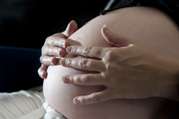Endometrium will reject poor embryo by supressing genes.
(Medical Xpress)—Fertility experts at the University of Southampton and University of Warwick have found new insights into why some fertilized eggs can embed in a uterus and why some do not.
Led by Nick Macklon, Professor of Gynecology and Obstetrics at the University of Southampton and Professor Jan Brosens at the University of Warwick, the research has shown that if the embryo quality is poor, the endometrium will subdue a large number of the genes involved in determining whether the embryo is accepted.
The embryo will then be left to disintegrate and the cycle will reset.
The research is being presented at the University of Southampton's Institute for Life Sciences Conference Reproductive Biology – from gametes to systems, and between generations, today (17th September) by Professor Macklon.
The conference is to focus on reproductive biology, reproductive medicine, the problems that many couples face and how such problems are being scientifically investigated. There will be a key note speech from Professor Robert Winston.
Professor Macklon comments: "Our research has shown that one of the signals which the uterus can pick up on in determining the quality of the embryo is the amount of trypsin it gives off. The lack of trypsin signals appear to indicate to the endometrium that the embryo's quality is not very high and initiates a reduction in receptivity to implantation."
It is hoped the discovery, which was also recently presented at the Society for the Study of Reproduction, will open new avenues to develop new techniques to improve the success rate of IVF.
Professor Macklon, who is also Director of the Complete Fertility Centre, Southampton, adds: "One in six couples will experience some sort of infertility, which can be both frustrating and daunting, and many will turn to IVF.
"But the big problem in IVF is still the low chance of getting embryos to implant. These new insights into how an endometrium chooses an embryo may open new avenues to develop new treatments for this."
During the study, which also involved the University of Utrecht, the researchers took the fluid in which the embryos had been cultured and incubated it with endometrial stromal cells. They then measured the reaction of the genes in the endometrium. The team found almost no reaction when the media had contained good quality embryos, but a huge reaction when it had contained bad quality embryos. The genes, which were down-regulated, are known to be important in implantation, showing that the uterus can choose the best embryo.
The team also found that the same process took place in-vivo. The team placed the fluid, which had contained good and bad quality embryos, in the uterus of a mouse and the same effects were seen.
Professor Macklon's presentation is one of many that will take place at the conference today. Others topics include the impact of diet on reproduction, epigenetics of stem cells and the impact of calcium at fertilization.
Professor Peter Smith, Director of the Institute for Life Sciences, says: "The University of Southampton has a long-standing reputation for ground-breaking research in fertility and reproductive issues. We are delighted to welcome Professor Robert Winston along with all the other speakers to share their insights with us."
More information: www.southampton.ac.uk/ifls/new … ifls_conference.page
Provided by University of Southampton


















